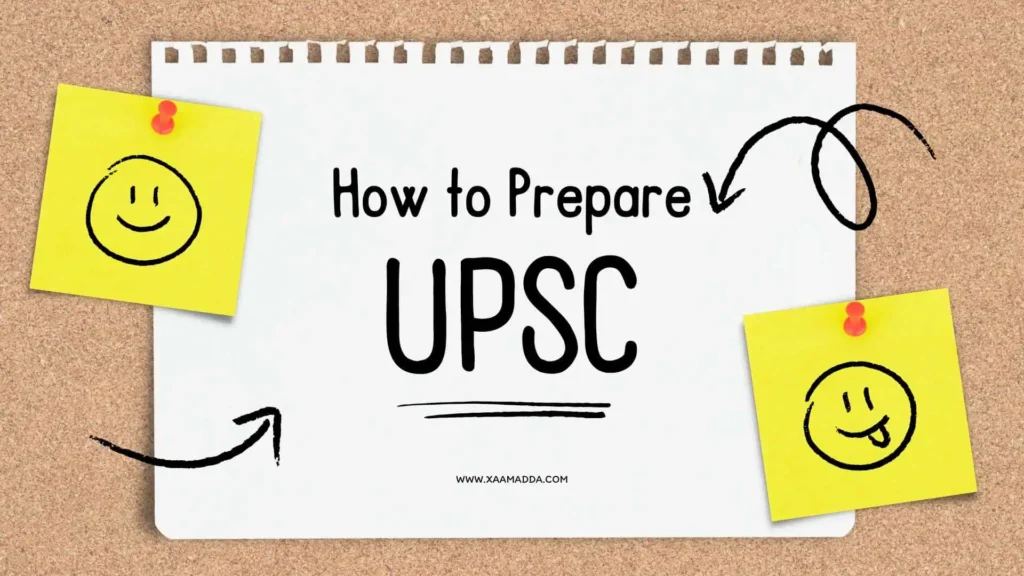Are you wondering how to prepare for UPSC exam in 6 months? Ever dreamed of making a positive impact on India’s future? If your answer is YES, Read this article to find out the Secret Formula for UPSC preparation in 6 months that has helped countless aspirants achieve their dreams.
The Civil Services Examination (CSE) is your ticket to the grandest stage of governance. Cracking the UPSC exam in just 6 months is a challenging but achievable goal and the rewards are beyond measure. Think influencing policies, leading millions, and making a real difference in people’s lives.
But let’s be real: It’s not a walk in the park. The UPSC CSE is a long race, not a quick sprint. You’ll need consistency, strategy, and a whole lot of motivation. But with the right guidance and a never-say-die attitude, you can crack UPSC in just 6 months.
This article is your roadmap to UPSC CSE 2025 Preparation. In this article we’ll break down the UPSC exam, share tips from toppers, and offer advice on staying focused and motivated.
Remember, there’s no magic formula for success. It’s about hard work, smart study, and believing in yourself.
So, are you ready to crack the UPSC exam? Let’s learn the strategies and tips on how to prepare for UPSC in just 6 months and make your dreams a reality.
Understanding the UPSC CSE: Your Path to Public Service
The UPSC CSE is a highly competitive exam that selects candidates based on merit. It’s a multi-stage process that tests your knowledge, analytical skills, and aptitude for public service.
The UPSC Civil Services Examination (CSE) is a gateway to a fulfilling career in public service. It’s a rigorous test that identifies and recruits talented individuals to fill crucial administrative, police, and diplomatic roles.
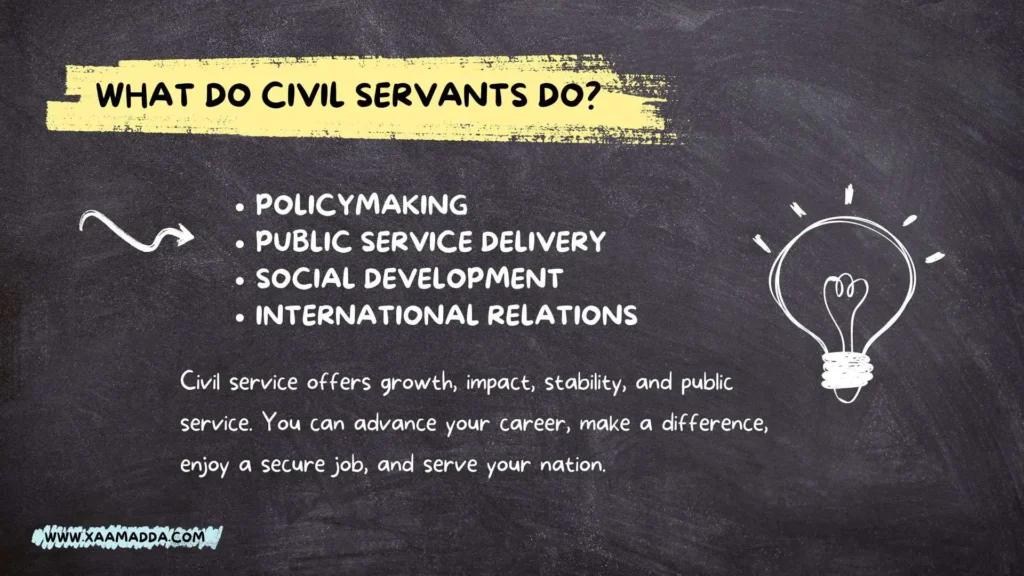
What do civil servants do?
Civil servants are the backbone of India’s governance. They play a pivotal role in:
- Policymaking: Formulating and implementing policies that shape the nation’s direction.
- Public service delivery: Ensuring efficient and accessible public services to citizens.
- Social development: Addressing social issues, uplifting marginalized communities, and promoting inclusivity.
- International relations: Representing India on the global stage and fostering diplomacy.
What are the benefits of joining the civil service?
A career in the civil service offers:
- Growth and development: Opportunities for career advancement, diverse roles, and continuous learning.
- Impact: The chance to make a positive difference in the lives of millions of people.
- Stability: A secure and respected profession with a pension scheme.
- Public service: The satisfaction of serving the nation and contributing to its progress.
Want to know more?
Check out the official UPSC notification for detailed information on:
- Eligibility criteria: The qualifications required to apply.
- Services offered: The various roles and departments you can join.
Are you ready to take the challenge and become a civil servant?
Is the UPSC CSE Right for You?
So, you’re thinking about UPSC preparation in 6 months? Awesome! It’s a big decision, but it can be a really rewarding one. Let’s break down what it’s all about.
Are you ready for a challenge?
- Passion for Public Service: Do you want to make a real difference in the world? Are you driven to serve your country and its people?
- Self-Assessment: Are you a quick thinker, a good communicator, and a problem-solver? These skills are essential for a civil servant.
- Commitment: Are you prepared to dedicate years to studying and preparing for the exam? It’s a tough journey, but the rewards can be immense.
Not sure?
- Talk to the Pros: Chat with current or former civil servants. They can give you the inside scoop on what it’s really like.
- Explore Other Options: If the CSE isn’t quite right for you, there are plenty of other ways to make a positive impact.
Trust Your Gut
At the end of the day, the decision is yours. If you feel a strong pull towards public service and believe the UPSC CSE is the right path, go for it!
How To Prepare For UPSC In 6 Months? Your Study Blueprint
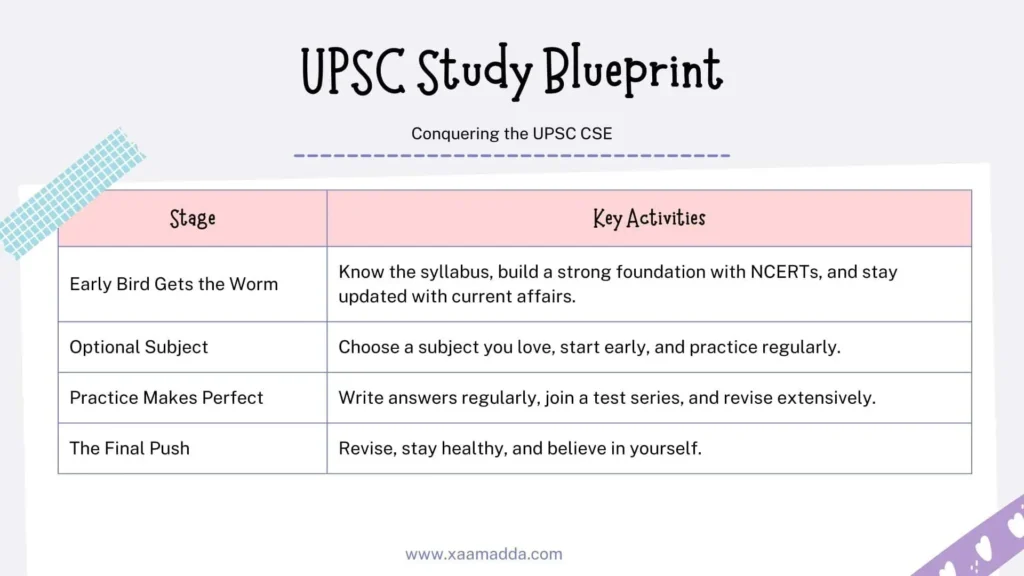
So, you’ve decided to crack the UPSC CSE in 6 months! Awesome! Now, let’s create a study plan that’ll help you conquer this beast.
The Early Bird Gets the Worm
- Know Your Enemy: Dive deep into the UPSC syllabus. Understand every nook and cranny.
- Build a Strong Foundation: Start with the basics. NCERTs are your Best Friends Forever here.
- Current Affairs Cramming: Stay updated with daily news. It’s like a superhero’s superpower.
Optional Subject: Choose Wisely
- Find Your Passion: Pick a subject you love. It’ll make the journey less painful.
- Start Early: Give yourself enough time to master your optional.
Practice Makes Perfect
- Write, Write, Write: Practice writing answers regularly. It’s like training for a marathon.
- Join a Test Series: Test your knowledge and identify your weak areas.
The Final Push
- Revise, Revise, Revise: The closer you get to the UPSC exam, the more you need to revise.
- Stay Healthy: Eat well, sleep well, and exercise. A healthy mind is a happy mind.
UPSC Preparation in 6 Months: A Timeline
| Month | Subject/Theme | Action |
|---|---|---|
| June 2024 | Syllabus and Exam Pattern | Analyze the syllabus in detail. Practice with previous year question papers for both Prelims and Mains. |
| July 2024 | Polity/Economy | Cover key chapters and make concise notes. Practice with MCQs. |
| August 2024 | History/Art and Culture | Cover key chapters and make concise notes. Practice with MCQs. |
| September 2024 | Geography/Environment | Cover key chapters and make concise notes. Practice with MCQs. |
| October 2024 | Optional Subject | Choose your optional based on interests and strengths. Start studying and practicing with past papers. |
| November-December 2024 | Optional Subject | Continue studying and practicing. Consider changing your optional if needed. |
| December 2024 | S&T, IR, Social Issues, CSAT | Consolidate current affairs of the past 6 months. Begin CSAT preparation. |
| January 2025 | Core Subjects, Answer Writing, Test Series | Revise core subjects and practice answer writing. Join a test series. |
| February 2025 | Core Subjects, Answer Writing, Test Series, Optional Revision | Continue revising core subjects and practicing answer writing. Revisit your optional subject. |
| March 2025 | Prelims | Revise for the Prelims exam, focusing on key topics. |
| April 2025 | Prelims | Focus on static and current affairs in a 70:30 ratio. |
| May 2025 | Prelims, Exam | Take the Prelims exam. Begin final revision for Mains. |
| June 2025 | Essay, Ethics, Optional | Prepare pointers for essay and ethics. Revise Paper 1 of your optional. |
| July 2025 | GS III, GS I, GS II | Practice writing answers for Mains. |
| August 2025 | GS I-IV, Optional | Continue practicing for Mains, focusing on all subjects and your optional. |
| September 2025 | Mains Exam | Take the Mains exam. Stay healthy and revise key concepts. |
Must-Have Books and Study Material for UPSC Preparation in 6 Months
NCERTs: The Foundation
Start with NCERT textbooks. They’re like the building blocks of your knowledge.
General Studies (Prelims and Mains):
- Polity: “Indian Polity” by M. Laxmikanth is a classic.
- Economy: “Indian Economy” by Ramesh Singh is another must-read.
- History: Choose either “History of Modern India” by Bipan Chandra or “Spectrum A Brief History of Modern India” by Rajiv Ahir.
- Geography: “Certificate Physical and Human Geography” by G.C. Leong is a great resource.
- Current Affairs: Stay updated with “The Hindu” or “The Indian Express,” and read magazines like “Yojana” and “Kurukshetra.”
Other Essential Resources:
- General Studies Manuals: Consider using manuals from Tata McGraw-Hill or MHE for GS Paper I and II.
- Culture: “The Wonder that was India” by A.L. Basham is a great resource for Indian art and culture.
- Environment: “Environment for Civil Services Prelims and Mains” by Khuller is a must-read.
- CSAT: Practice with “CSAT – Topic-wise Solved Papers” by Disha Experts.
- Online Resources: Follow reliable online platforms, UPSC preparation websites, and government resources like PIB, PRS, and official government websites.
Tips for Effective Note-Taking to Start Preparing For UPSC
Cracking the UPSC exam in just 6 months requires a strategic approach, including effective note-taking techniques. Here, we’ll discuss essential tips to help you maximize your learning and retention
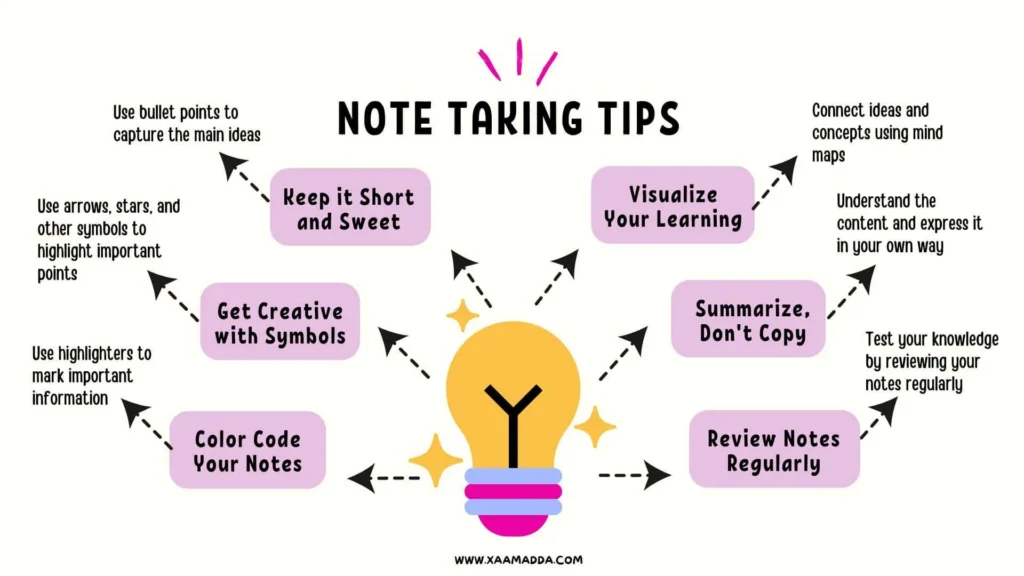
Keep it Short and Sweet:
- Bullet Points: Ditch long sentences. Use bullet points to capture the main ideas.
- Headings and Subheadings: Organize your notes with clear headings and subheadings.
Get Creative with Symbols:
- Abbreviations: Use abbreviations like “govt” for “government” or “w/o” for “without.”
- Symbols: Use arrows, stars, and other symbols to highlight important points.
Color Code Your Notes:
- Highlight Key Points: Use highlighters to mark important information.
- Differentiate Sections: Use different colors or fonts to separate sections.
Visualize Your Learning:
- Diagrams and Flowcharts: Create visual representations to understand complex concepts.
- Mind Maps: Connect ideas and concepts using mind maps.
Summarize, Don’t Copy:
- Put It in Your Own Words: Understand the content and express it in your own way.
- Focus on Key Ideas: Don’t try to write down everything.
Real-World Examples:
- Case Studies: Relate concepts to real-world examples.
- Illustrations: Use diagrams or pictures to visualize information.
Organize Your Notes:
- Separate Sections: Create separate sections for different subjects or topics.
- Use Headings: Use clear headings and subheadings to structure your notes.
Review Regularly:
- Quiz Yourself: Test your knowledge by reviewing your notes regularly.
- Update and Revise: Add new information and revise as needed.
Remember: The best note-taking method is the one that works for you. Experiment and find what helps you learn and retain information most effectively.
Understanding The UPSC Prelims Exam Syllabus & Pattern
The UPSC CSE starts with the Prelims exam, a two-part hurdle that tests your knowledge and analytical skills. Let’s break down what you’ll face:
1. General Studies Paper I (GS Paper I):
- Duration: 2 hours
- Marks: 200
- Questions: 100 MCQs
- Negative Marking: 1/3rd
This paper covers a wide range of topics, including:
- History: Ancient, Medieval, and Modern India
- Geography: Indian Geography, Physical Geography, and Environmental Geography
- Polity and Governance: Indian Constitution, Public Administration, and more
- Economy: Indian Economy, Sustainable Development, and Social Sector Initiatives
- Science and Technology: General Science, Space Technology, and Environmental Science
- Environment and Ecology: Environmental issues, legislation, and conservation
- Current Affairs: National and International events
2. General Studies Paper II (CSAT Paper II):
- Duration: 2 hours
- Marks: 200
- Questions: 80 MCQs
- Negative Marking: 1/3rd
This paper tests your:
- Comprehension: Understanding written text
- Logical Reasoning: Analyzing information and drawing conclusions
- Analytical Ability: Solving problems and making decisions
- Problem-Solving: Finding solutions to complex issues
Remember: The Prelims exam is a qualifying stage. Your score doesn’t count towards your final rank. The goal is to clear the cutoff and move on to the Mains exam.
How to Prepare for UPSC Prelims in 6 Months?
Cracking the UPSC Prelims in just 6 months of preparation? It’s achievable! Here, we’ll discuss a strategic plan to help you crack this challenging UPSC exam.
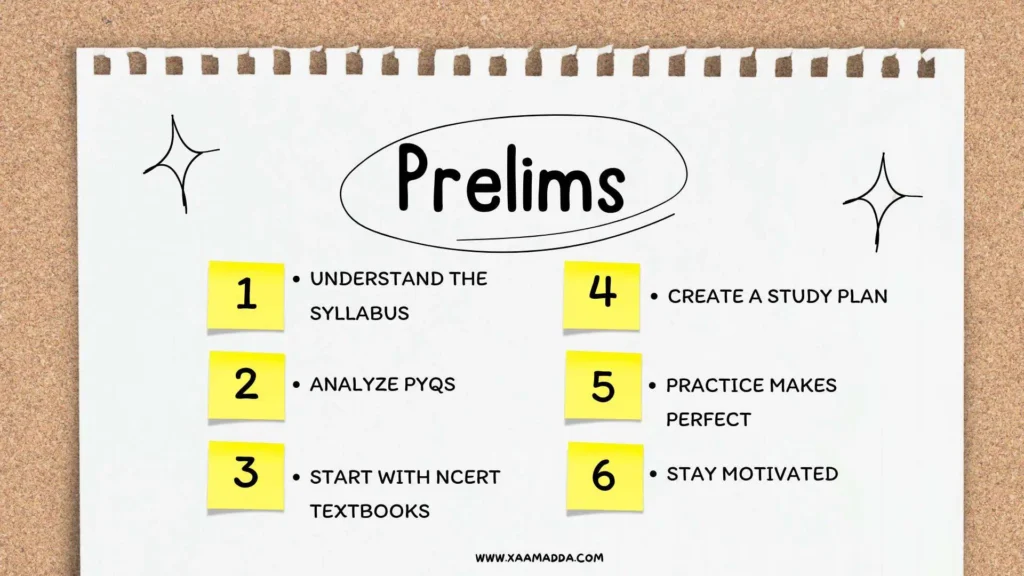
1. Know Your Enemy:
- Understand the Syllabus: Dive deep into the UPSC prelims syllabus. Know every topic, subtopic, and the weight it carries.
- Analyze PYQs: Past year question papers are your crystal ball. They reveal the exam’s pattern, difficulty level, and frequently asked topics.
2. Build a Fortress of Knowledge:
- NCERTs are Your Foundation: Start with NCERT textbooks. They’re the building blocks of your knowledge.
- Standard Reference Books: Supplement your NCERTs with standard reference books for a deeper understanding.
- Current Affairs: Stay updated with daily newspapers, magazines, and online resources.
3. Create a Study Plan:
- Tailor It to You: Design a study plan that suits your learning style and time constraints.
- Be Consistent: Stick to your plan. Consistency is key to success.
4. Practice Makes Perfect:
- Mock Tests: Test your knowledge regularly with mock tests.
- Analyze Your Performance: Identify your strengths and weaknesses to focus your preparation.
- Time Management: Practice time management to ensure you finish the exam on time.
5. Stay Motivated:
- Find Your Why: Remember why you’re doing this. Your motivation will keep you going.
- Join a Study Group: Discuss with fellow aspirants. Sharing knowledge and experiences can be beneficial.
Remember: The UPSC Prelims is a challenging exam, but with the right strategy and dedication, you can conquer it. Stay focused, believe in yourself, and give it your best shot.
Understanding The UPSC Mains Exam Syllabus and Pattern

The UPSC Mains is a marathon of nine papers. Two are qualifying papers (languages), and the other seven determine your final rank.
The UPSC syllabus is your roadmap. Study it thoroughly to ensure you cover all the required topics. For example, under “Effects of globalization on Indian society” in GS-1, explore how globalization has impacted women, children, culture, and crime. Don’t just memorize facts, but understand the underlying concepts and their implications.
Let’s break it down:
| Paper | Subject | Topics |
|---|---|---|
| Paper A | Indian Language | Proficiency in one of the scheduled languages. |
| Paper B | English | Understanding of English language and comprehension skills. |
| Essay | General | Write two essays on topics from various fields. |
| General Studies I | Indian Heritage and Culture, History, and Geography of the World and Society | Topics related to India’s history, culture, geography, and global affairs. |
| General Studies II | Governance, Constitution, Polity, Social Justice, and International Relations | Topics related to Indian government, constitution, social issues, and international relations. |
| General Studies III | Technology, Economic Development, Bio-diversity, Environment, Security, and Disaster Management | Topics related to technology, economy, environment, and security. |
| General Studies IV | Ethics, Integrity, and Aptitude | Ethical and moral questions, decision-making skills, and attitude. |
| Optional Subject – Paper I | Varies by chosen subject | Topics specific to the chosen optional subject. |
| Optional Subject – Paper II | Varies by chosen subject | Topics specific to the chosen optional subject. |
1. Languages:
- Paper A: Choose one of the scheduled languages in the Indian Constitution. Think of it as a warm-up lap.
- Paper B: Test your English language skills. Brush up on grammar, vocabulary, and comprehension.
2. Essay:
- Write to Impress: Your essay is your chance to shine. Write two essays (1000-1200 words each) on topics from various fields. Show off your analytical and critical thinking. Remember, it’s not just about knowledge, but also about your ability to express yourself clearly and persuasively.
3. General Studies:
- Paper I: Explore India’s rich history, culture, and geography. Don’t forget to dive into world history as well.
- Paper II: Understand the nuts and bolts of Indian governance, constitution, social justice, and international relations.
- Paper III: Dive into technology, economy, environment, security, and disaster management. Think of it as a global affairs course.
- Paper IV: Demonstrate your ethics, integrity, and aptitude. This paper tests your character and decision-making skills.
4. Optional Subject:
- Choose Wisely: Pick one optional subject that aligns with your interests and strengths.
- Two Papers: Prepare for both Paper I and Paper II of your chosen subject.
Ethics: More Than Just Theory
Ethics is a two-part paper in the Mains exam.
1. Section A: The Theory
- Fundamental Values: Explore the meaning of words like integrity, ethics, morality, beliefs, and value systems.
- Foundational Values for Civil Servants: Understand the core values expected of civil servants, such as impartiality, neutrality, empathy, and compassion.
2. Section B: Case Studies
- Real-World Scenarios: Prepare to analyze case studies based on ethical dilemmas faced by civil servants.
- Decision-Making Skills: Demonstrate your ability to apply ethical principles to real-world situations.
Why is Ethics Important?
Ethics is not just for the exam. It’s the foundation of your future career as a civil servant. Understanding ethical principles will guide your actions and decisions throughout your public service.
Tips for Preparing for Ethics:
- Read Widely: Explore philosophical texts, biographies of ethical leaders, and current affairs related to ethics.
- Practice Case Studies: Regularly practice solving ethical dilemmas to improve your decision-making skills.
- Discuss with Peers: Engage in discussions with fellow aspirants to gain different perspectives and insights.
Remember: Thoroughly prepare for the ethics section. It’s a crucial part of the UPSC syllabus and will reflect your character and suitability for civil service.
Essay Writing Tips
Effective essay writing is crucial for UPSC exam success. Here, we’ll provide essential tips to help you write compelling essays and increase your chances of cracking the UPSC exam in 6 months of preparation.
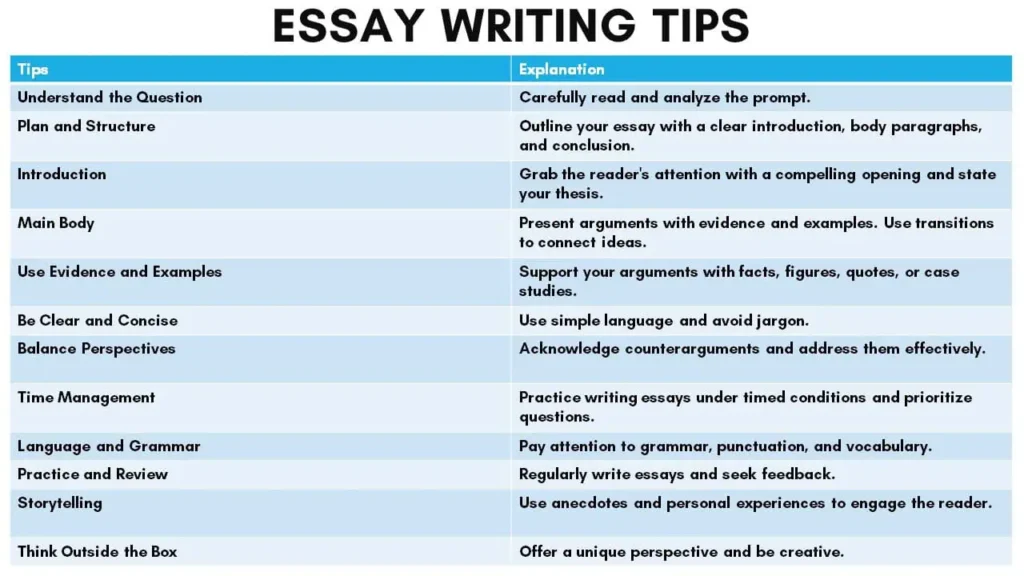
1. Crack the Code:
- Understand the Topic: Read the question carefully. What are the key themes and arguments?
- Plan Your strategy: Outline your essay. Decide on your main points and how you’ll connect them.
2. Hook Your Reader:
- Grab Attention: Start with a bang! A compelling introduction can make a world of difference.
- State Your Thesis: Clearly state your main argument or point.
3. Build Your Case:
- Strong Body Paragraphs: Each paragraph should focus on a specific point. Use evidence and examples to support your arguments.
- Flow and Coherence: Use transitions to connect your ideas smoothly.
4. Back It Up:
- Evidence is Key: Support your arguments with facts, figures, quotes, or case studies.
- Real-World Examples: Make your essay relatable with real-world examples.
5. Clarity is King:
- Simple Language: Avoid jargon and complex terms. Keep it clear and concise.
- Proofread Carefully: Check for grammar, spelling, and punctuation errors.
6. Balance Your Views:
- Consider All Sides: Acknowledge counterarguments and address them effectively.
- Show Your Analytical Skills: Demonstrate your ability to evaluate different perspectives.
7. Time Management:
- Practice Makes Perfect: Practice writing essays under timed conditions.
- Prioritize: Answer the questions you’re most confident about first.
8. The Power of Storytelling:
- Engage Your Reader: Use storytelling techniques to make your essay more interesting.
- Anecdotes and Examples: Share personal experiences or relevant anecdotes to illustrate your points.
9. Think Outside the Box:
- Unique Perspective: Offer a fresh perspective on the topic.
- Creativity: Be creative and original in your writing.
10. Practice Makes Perfect:
- Write Regularly: The more you write, the better you’ll become.
- Seek Feedback: Ask mentors or friends to review your essays and provide feedback.
Remember: Essay writing is a skill that improves with practice. The more you write, the better you’ll become.
UPSC General Studies Preparation in 6 Months
Preparing the UPSC General Studies papers in 6 months requires a focused and strategic approach.
The General Studies papers are vast.
Break them down into manageable subjects and focus on understanding the key concepts.
Don’t just memorize facts; aim to develop a comprehensive understanding of each subject.
Here, we’ll provide important tips and strategies to help you crack this exam.
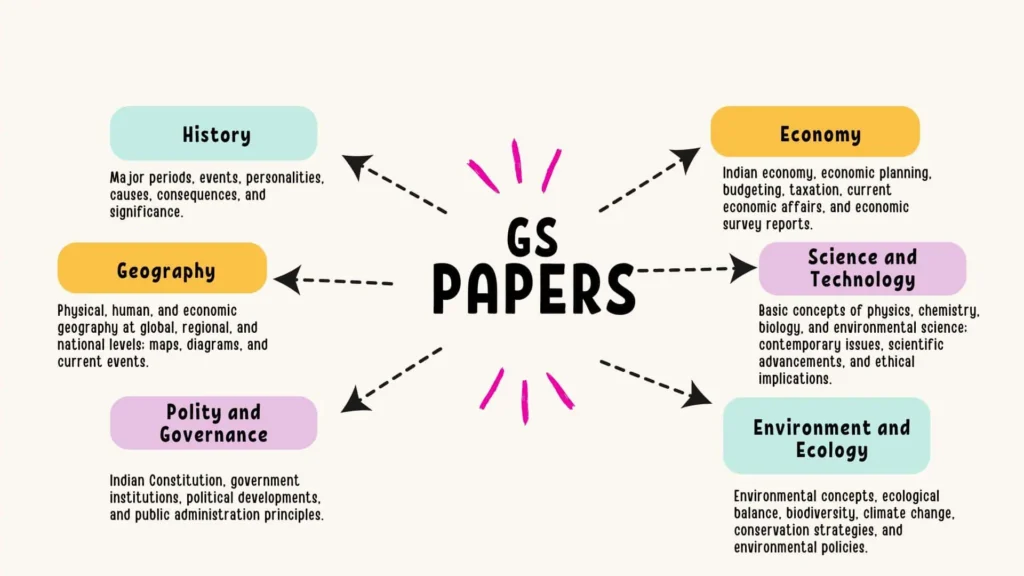
1. History: A Journey Through Time
- Beyond Dates and Facts: Don’t just memorize facts. Understand the underlying themes, connections, and significance of historical events.
- Primary Sources: Explore primary sources like historical documents, letters, and speeches to gain firsthand insights.
- Art and Culture: Understand how art, literature, and culture reflect historical periods and societal changes.
2. Geography: Our Planet’s Story
- Visualize: Use maps, diagrams, and atlas to create mental pictures of geographical features.
- Connect the Dots: Understand how geographical factors influence history, economy, and society.
- Case Studies: Analyze case studies of geographical phenomena to apply your knowledge.
3. Polity and Governance: The Rules That Shape Our World
- Know Your Constitution: Read the Indian Constitution thoroughly. Understand fundamental rights, duties, and government structure.
- Current Affairs: Stay updated on the latest political developments, constitutional amendments, and the workings of government institutions.
- Case Studies: Analyze case studies of governance challenges and their solutions.
4. Economy: Understanding the Money Machine
- Get the Basics: Grasp the different sectors of the Indian economy, from agriculture to services.
- Learn the Rules: Study economic policies, planning, budgeting, and financial institutions.
- Stay Updated: Keep an eye on current economic affairs, government schemes, and initiatives.
- Refer to Reliable Sources: Economic survey reports, budget documents, and standard textbooks are your go-to resources.
5. Science and Technology: The Future is Now
- Science Basics: Cover the fundamentals of physics, chemistry, biology, and environmental science.
- Stay Ahead: Focus on cutting-edge topics like space exploration, biotechnology, and Artificial Intelligence.
- Understand the Impact: Explore the ethical, social, and economic implications of scientific advancements.
6. Environment and Ecology: Our Planet’s Health
- Learn the Rules: Study environmental concepts, biodiversity, climate change, and conservation strategies.
- Human Impact: Understand how human activities affect the environment.
- Stay Informed: Keep track of environmental policies, initiatives, and international agreements.
- Explore India’s Natural Beauty: Familiarize yourself with national parks, wildlife sanctuaries, and biosphere reserves.
7. Current Affairs
- Daily Dose: Read newspapers, magazines, and reliable online sources.
- Focus on Key Topics: Pay attention to national and international events, government policies, and developments.
- Take Notes: Make notes on important current affairs topics and their relevance to the GS papers.
- Analyze and Connect: Understand the impact of current affairs on society, governance, economy, and international relations.
Remember: Practice makes perfect. Write answers, solve previous year papers, and take mock tests to assess your preparation and improve your answer presentation skills for each subject.
Choosing Your Optional Subject: Tips and Strategy
Your optional subject can make or break your UPSC journey. Are you ready to choose wisely and crack the UPSC exam in 6 months? Here, we’ll help you Choose the right optional subject for your UPSC journey and find the perfect fit for your strengths and interests.
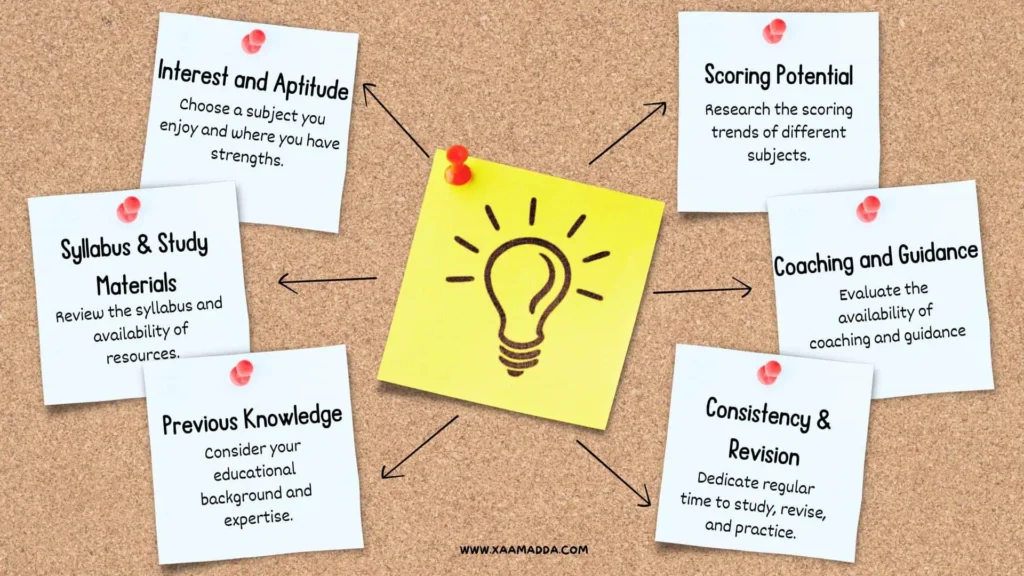
1. Follow Your Passion:
- Find Your Interest: Select a subject you genuinely enjoy. Your passion will fuel your motivation and make the journey enjoyable.
- Strengths and Weaknesses: Consider your academic background, interests, and areas where you excel.
2. Syllabus and Study Materials:
- Research Thoroughly: Review the syllabus of each optional subject.
- Availability of Resources: Ensure there are ample study materials, books, and online resources available for your chosen subject.
3. Leverage Your Background:
- Past Knowledge: If you have a strong foundation in a subject, it can be a natural choice.
- Academic Expertise: Consider your educational background and areas of expertise.
4. Scoring Potential:
- Analyze Trends: Research the scoring potential of different optional subjects.
- Beyond Scores: Remember, your optional subject is just one part of the exam. Focus on overall preparation.
5. Coaching and Guidance:
- Seek Expert Help: Consider joining a coaching institute or seeking guidance from experienced mentors.
6. Time Management:
- Evaluate Effort: Assess how much time and effort each optional subject requires.
- Balance Your Workload: Choose a subject that fits well with your overall preparation strategy.
7. Consistency is Key:
- Regular Study: Dedicate consistent time to your optional subject.
- Revision and Practice: Regularly revise concepts, practice answer writing, and solve previous year’s papers.
8. Beyond the Basics:
- Explore the Subject: Go beyond the syllabus and explore the subject in depth.
- Connect the Dots: Understand how your optional subject relates to other parts of the exam.
- Unique Insights: Offer unique perspectives and insights in your answers.
Remember: The key to success in your optional subject is a combination of interest, dedication, and strategic planning. Choose wisely and prepare diligently.
The Personality Test: UPSC Interview Preparation In 6 Months
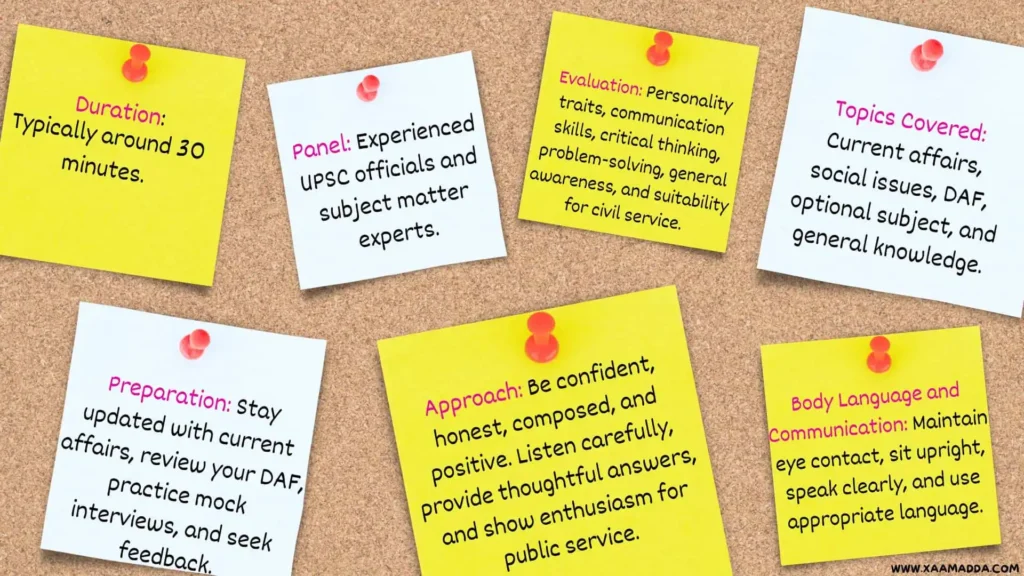
The Personality Test, or Interview, is the final stage of the UPSC CSE. It’s your chance to shine and convince the panel that you’re the right person for the job.
You know, this important stage can make or break your UPSC dreams. So, Let’s find out the secrets to success in this final challenge.
What to Expect:
- Duration: Typically around 30 minutes.
- Panel: A panel of experienced UPSC officials and subject matter experts.
- Evaluation: The panel assesses your personality, communication skills, critical thinking, problem-solving, general awareness, and suitability for civil service.
Topics Covered:
- Current Affairs: Stay updated on national and international events.
- Social Issues: Understand key social issues and government policies.
- Your Background: Be prepared to discuss your DAF (Detailed Application Form).
- Optional Subject: Brush up on your optional subject knowledge.
- General Knowledge: Expect questions on a wide range of topics, from history and geography to science and technology.
How to Crack the Interview?
- Be Confident and Composed: Project a positive and confident image.
- Listen Carefully: Pay attention to the questions and provide thoughtful answers.
- Be Honest: Honesty is the best policy.
- Maintain a Positive Attitude: Stay calm and composed even under pressure.
- Practice Makes Perfect: Prepare by practicing mock interviews and seeking feedback.
- Show Your Passion: Demonstrate your enthusiasm for public service and your commitment to making a difference.
- Think on Your Feet: Be prepared to answer unexpected questions and think critically.
- Be Yourself: Let your personality shine through. The panel wants to see who you are as a person.
Remember: The interview isn’t just about knowledge; it’s about your personality and suitability for civil service. Show your best self and you’ll be well on your way to success.
Your DAF: A Window to Your Personality
Your DAF (Detailed Application Form) is your personal statement to the UPSC. It’s your chance to showcase your personality, skills, and experiences. Let’s learn how to write a compelling DAF and the strategy to crack the UPSC exam in 6 months.

1. Choose Your Hobbies Wisely:
- Avoid Irrelevant Hobbies: Don’t list hobbies just for the sake of it. Focus on hobbies that reflect your personality, interests, and values.
- Prepare Thoroughly: If you include a hobby, be prepared to answer questions about it in detail.
2. Seek Guidance:
- Consult Experts: Talk to experienced candidates or mentors who have gone through the process.
- Design Your DAF: Your DAF can significantly influence your interview. Make sure it’s well-written and highlights your strengths.
3. Be Honest, But Smart:
- Be Authentic: Include details that are true to you.
- Be Strategic: Focus on adding things that can spark interesting conversations and showcase your unique qualities.
4. Plan Ahead:
- Start Early: Consider filling out a rough DAF at the beginning of your preparation.
- Develop Your Personality: Use your DAF as a guide to develop your hobbies and interests.
5. Stay Calm Under Pressure:
- Mistakes Happen: Don’t let mistakes during the interview derail you.
- Maintain Positivity: Stay calm, confident, and polite, even if things don’t go as planned.
6. Use Your DAF to Your Advantage:
- Highlight Key Achievements: Showcase your academic accomplishments, extracurricular activities, or work experience.
- Tell a Story: Use your DAF to create a narrative about your journey and aspirations.
- Connect the Dots: Show how your experiences and interests relate to your goals in public service.
Remember: Your DAF is a reflection of you. Choose your hobbies and experiences carefully, and be prepared to discuss them confidently. It’s your chance to make a lasting impression on the interview panel.
Beyond the Syllabus: Essential Skills for UPSC Success
Are you ready to take your UPSC preparation to the next level? Here, we’ll share essential strategies to enhance your skills and crack the UPSC exam in 6 months.
From improving your analytical thinking to developing effective communication skills, we’ll cover everything you need to know to succeed. Let’s discuss those skills in more detail.
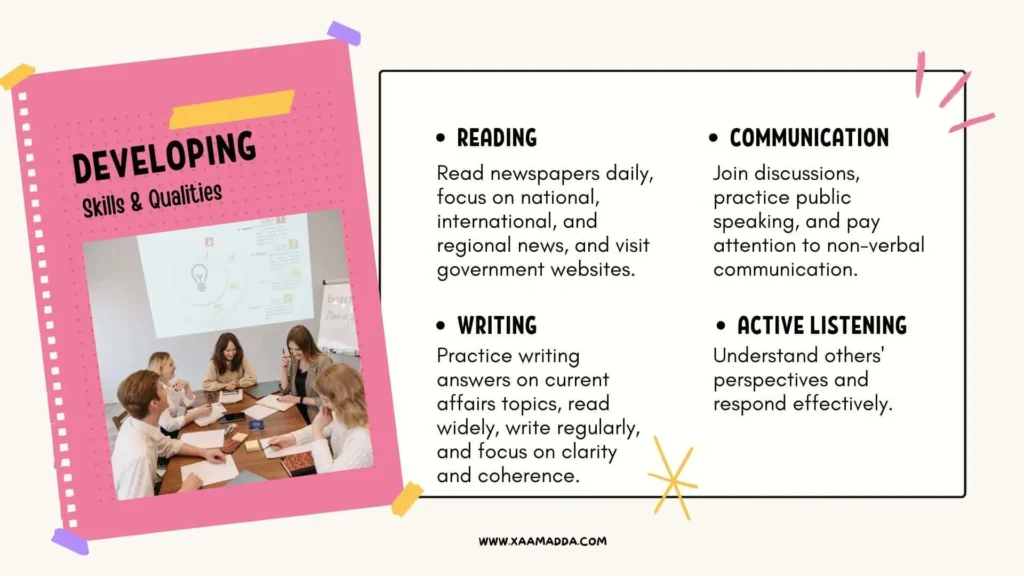
1. Stay Informed:
- Daily Dose of News: Make reading newspapers a daily habit. Focus on national, international, and regional news.
- Government Websites: Visit government websites at all levels to stay updated on policies, initiatives, and reports.
- Join the Conversation: Participate in study groups or discussion forums to exchange ideas and insights with fellow aspirants.
- Think Critically: Analyze news articles and form your own opinions. Don’t just accept information at face value.
2. Practice Makes Perfect:
- Write Regularly: Practice writing answers on current affairs topics. This helps you develop a structured approach and improve your articulation skills.
- Seek Feedback: Share your writing with others and ask for their feedback. Constructive criticism can help you improve.
3. Enhance Your Writing Skills:
- Read Widely: Explore different writing styles by reading books, newspapers, magazines, and online articles.
- Write Daily: Practice writing regularly, starting with short exercises and gradually progressing to longer pieces.
- Focus on Clarity: Organize your thoughts and ensure your writing is clear, coherent, and well-structured.
- Vocabulary Building: Expand your vocabulary by learning new words and phrases.
4. Master Communication:
- Speak Up: Join debate clubs, participate in group discussions, or deliver presentations.
- Engage Your Audience: Work on communicating your thoughts clearly and effectively.
- Non-Verbal Communication: Pay attention to your body language, tone of voice, and eye contact.
- Active Listening: Practice active listening to understand others’ perspectives and respond effectively.
Mastering Time Management: Your Secret Weapon
Time is your most valuable asset when preparing for the UPSC exam in 6 months. Effective time management can help you:
- Stay organized and focused: Avoid feeling overwhelmed and prioritize tasks effectively.
- Reduce stress: Minimize procrastination and last-minute cramming.
- Improve efficiency: Make the most of your study time and avoid wasting precious hours.
Let’s learn how to use your time wisely to crack the UPSC exam in 6 months.
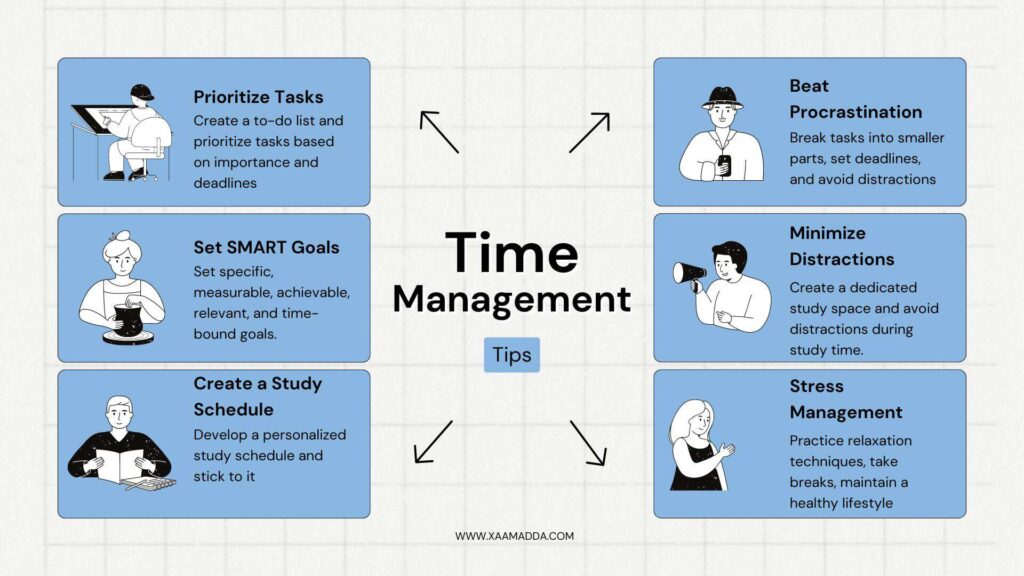
1. Prioritize and Plan:
- To-Do List: Create a list of tasks and prioritize them based on importance and deadlines.
- SMART Goals: Set specific, measurable, achievable, relevant, and time-bound goals.
- Time Blocking: Allocate specific time blocks for different tasks to ensure focus and efficiency.
2. Create a Study Schedule:
- Tailor It to You: Develop a schedule that fits your daily routine and preferences.
- Be Flexible: Allow for flexibility in your schedule to accommodate unexpected changes.
- Review and Adjust: Regularly review your schedule and make adjustments as needed.
3. Beat Procrastination:
- Break It Down: Divide tasks into smaller, manageable parts.
- Set Deadlines: Set deadlines for each task to create a sense of urgency.
- Reward Yourself: Celebrate small success to stay motivated.
4. Minimize Distractions:
- Create a Study Space: Find a quiet, dedicated place to study.
- Digital Detox: Turn off notifications and avoid distractions during study time.
- Mindfulness Techniques: Practice mindfulness to focus and reduce distractions.
5. Productivity Techniques:
- Pomodoro Technique: Work in focused bursts with short breaks.
- Timeboxing: Allocate specific time blocks for different tasks.
- Eisenhower Matrix: Prioritize tasks based on urgency and importance.
6. Stress Management:
- Relaxation Techniques: Practice deep breathing, meditation, or yoga.
- Take Breaks: Short breaks can help you stay refreshed and focused.
- Healthy Lifestyle: Prioritize sleep, nutrition, and exercise.
- Seek Support: Talk to friends, family, or fellow aspirants for support and encouragement.
Remember: Effective time management is essential for success. By following these tips, you can stay organized, motivated, and focused on your goals.
Pros and Cons of Coaching for UPSC Preparation in 6 Months
Are you considering joining a coaching institute to crack the UPSC exam in 6 months?
Choosing the right coaching can significantly boost your preparation.
Let’s discuss the Pros and Cons of coaching and help you find the perfect fit for your UPSC journey.
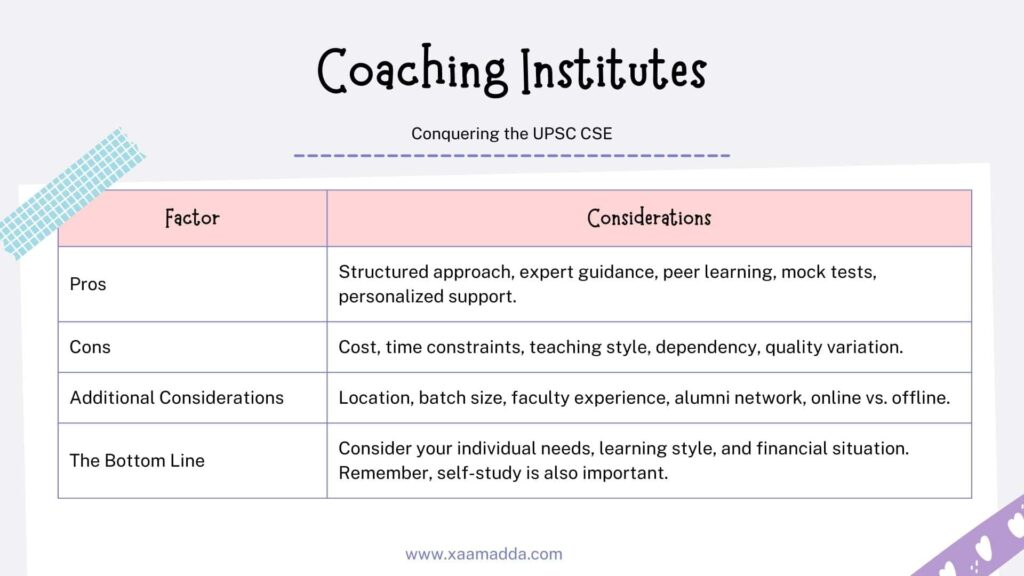
Pros:
- Structure: Coaching institutes provide a structured approach with a defined curriculum and schedule.
- Expert Guidance: Experienced faculty can offer valuable insights, strategies, and motivation.
- Peer Learning: Interact with like-minded aspirants and create a competitive environment.
- Mock Tests: Assess your preparation, identify weaknesses, and develop exam-taking skills.
- Personalized Support: Get clarification, feedback, and guidance from expert mentors.
Cons:
- Cost: Coaching can be expensive. Consider online resources as a more affordable option.
- Time Constraints: Coaching classes may have fixed schedules.
- Teaching Style: The teaching style may not suit your learning preferences.
- Dependency: Over-reliance on coaching can hinder self-study.
- Quality Variation: Research and choose reputable institutes.
Additional Considerations:
- Location: Consider the location of the coaching institute and your commute time.
- Batch Size: Smaller batch sizes can provide more personalized attention.
- Faculty Experience: Research the experience and qualifications of the faculty members.
- Alumni Network: Connect with alumni of the coaching institute to get their feedback.
- Online vs. Offline: Decide whether you prefer online or offline coaching based on your learning style and preferences.
Whether or not to join a coaching institute depends on your individual needs. Consider your learning style, financial situation, and time constraints.
Remember, while coaching can be beneficial, self-study and independent learning are equally important.
Coaching vs. Self-Study: Which is Right for You?
Are you thinking about joining a coaching institute or studying on your own for your UPSC preparation in 6 months? Both options have their advantages and disadvantages.
Let’s discuss some popular coaching institutes and strategy for effective self study to help you make an informed decision.
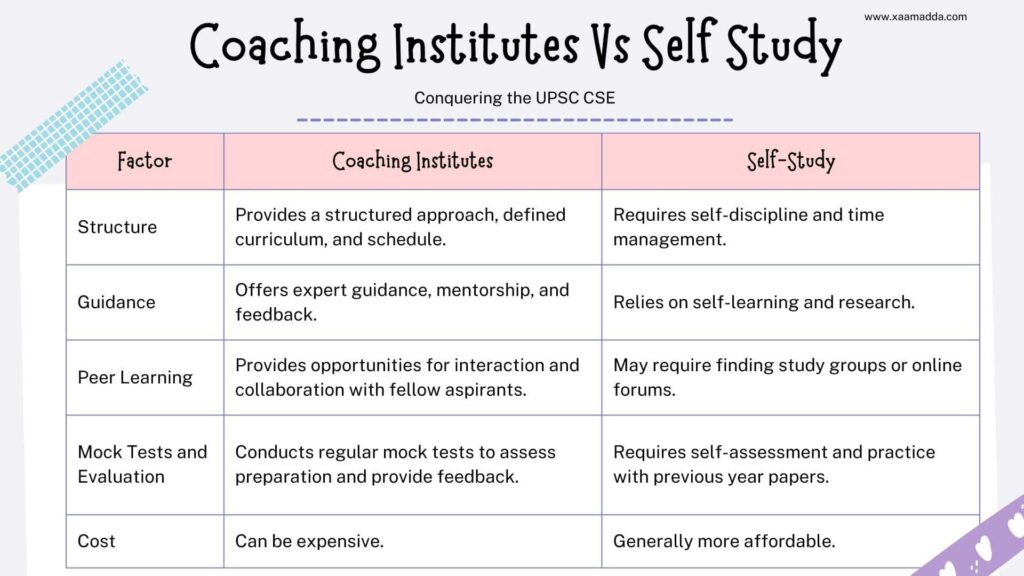
Popular Coaching Institutes:
- Vajiram and Ravi: Renowned offline institute with online courses.
- IASbaba: Online platform with free and paid courses.
- ForumIAS: Online community for UPSC aspirants.
- InsightsIAS: Comprehensive study materials and current affairs analysis.
- Vision IAS: Focuses on current affairs preparation.
Individual Faculty:
- Mrunal Patel: Economy
- Mr. Pratik Nayak: History
- Mr. Siddharth Arora: Polity
- Mr. Anudeep Durishetty: Essay
- Mr. Praveen Kishore: Sociology
Advantages of Self-Study
Self-study is essential for UPSC success. It helps you:
- Develop Discipline: Cultivate self-motivation and time management skills.
- Deepen Understanding: Explore concepts in-depth and seek clarification.
- Build a Strong Foundation: Gain a thorough understanding of the subjects.
- Self-Evaluate: Assess your progress and identify areas for improvement.
- Flexibility: Customize your study plan to suit your learning style and preferences.
- Cost-Effective: Self-study can be more affordable than coaching institutes.
- Independence: Develop self-reliance and problem-solving skills.
Tips for Effective Self-Study:
- Create a Study Plan: Allocate specific time for each subject.
- Find a Quiet Place: Choose a distraction-free environment.
- Use Effective Study Techniques: Experiment with different techniques to find what works best for you.
- Join Study Groups: Collaborate with fellow aspirants for discussions and motivation.
- Stay Updated: Keep track of current affairs and relevant news.
Remember: While coaching institutes can provide valuable guidance, self-study is essential for long-term success. Find the right balance between the two to achieve your goals.
UPSC Exam Day: Tips for Success
Here, we will discuss essential tips and strategies to help you stay calm, focused, and confident on exam day.
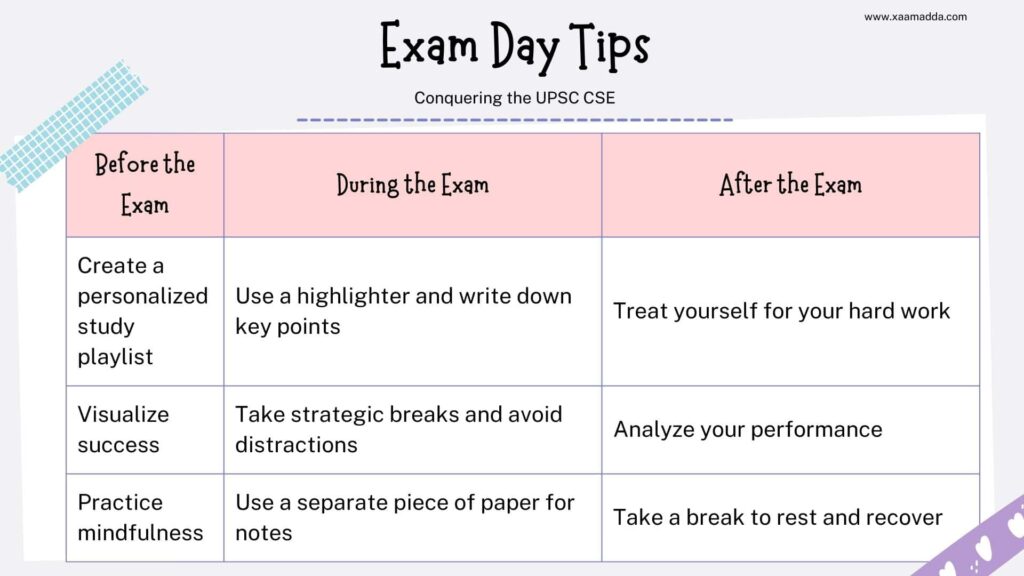
Before the Exam: Get Your Brain Ready
- Create a personalized study playlist: Curate a playlist of music that helps you focus and stay motivated. Experiment with different genres and tempos to find what works best for you.
- Visualize success: Imagine yourself cracking the UPSC exam, feeling confident and relaxed. Create a mental image of yourself successfully answering questions and achieving your goals.
- Practice mindfulness: Incorporate mindfulness techniques into your daily routine. Try deep breathing exercises, meditation, or yoga to reduce stress and improve focus.
During the Exam: Stay Calm and Cool Under Pressure
- Use a highlighter: Strategically highlight key points in your textbook or notes. This will help you identify important information and review it quickly before the exam.
- Write down key points: Write down key concepts, formulas, or definitions on a separate piece of paper. This can serve as a quick reference during the exam.
- Take a strategic break: If you’re stuck on a question, take a short break to clear your head. Step away from your desk, stretch, or take a few deep breaths.
- Avoid distractions: Turn off your phone and resist the urge to check social media. Create a distraction-free environment to focus on your exam.
Post-Exam: Celebrate Your Efforts
- Treat yourself: Reward yourself for your hard work with a favorite activity or treat. This will help you celebrate your accomplishments and stay motivated.
- Analyze your performance: After the exam, take some time to reflect on what went well and what could be improved. This will help you identify areas for growth and prepare for future exams.
- Take a break: Give your mind and body time to rest and recover after the exam. Engage in activities that you enjoy and that help you relax.
Remember: The key to UPSC exam success is preparation, positive mindset, and effective strategies. By following these tips, you’ll be well-equipped to tackle your exam with confidence.
Post-Exam Analysis: Learn from Your Mistakes
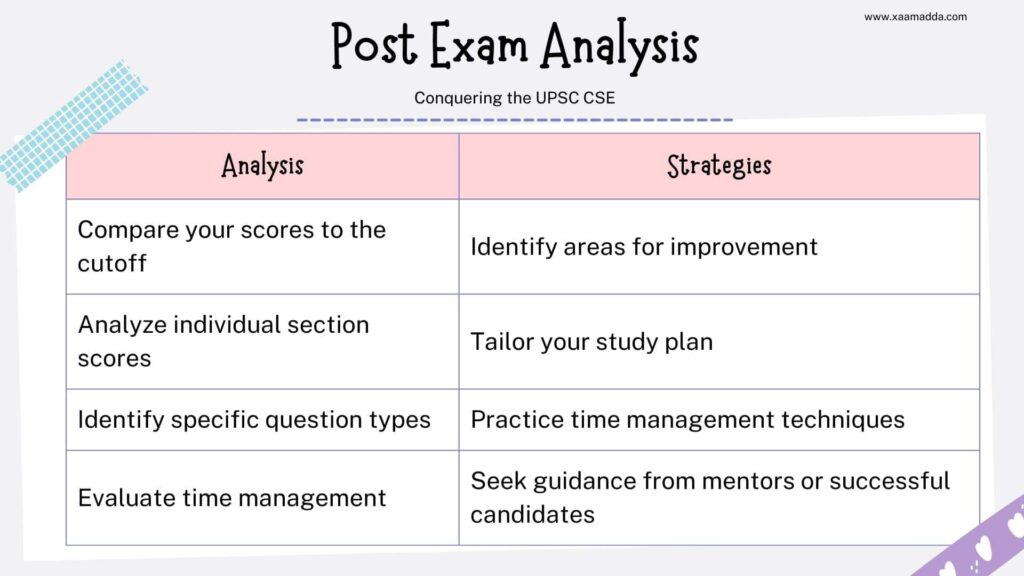
So, you’ve taken the UPSC CSE Exam! Now it’s time to analyze your performance and lay the groundwork for future success.
Understanding the Results
- Preliminary Exam Result: This is typically announced within a few weeks of the exam. It lists the candidates who have qualified for the Main Exam based on a cutoff score set by the UPSC.
- Main Exam Result: Declared a few months after the Main Exam, this result lists the candidates who have advanced to the Interview or Personality Test.
- Final Result: Announced after the Interview, this result includes the names and ranks of the successful candidates.
- Merit List: A ranking of candidates based on their overall performance in the Mains Exam and Interview.
Analyzing Your Performance
- Compare your scores to the cutoff: Assess how close or far your score was from the cutoff. This will give you a sense of where you stand in relation to other candidates.
- Analyze individual section scores: Examine your performance in each subject area. Identify subjects where you excelled and areas where you struggled.
- Identify specific question types: Analyze the types of questions you found challenging. Were they factual recall, analytical reasoning, or application-based?
- Evaluate time management: Assess how effectively you managed your time during the exam. Did you find yourself rushing through certain sections or running out of time?
Strategies for Future Attempts
- Self-assessment: Analyze your strengths and weaknesses to identify areas for improvement.
- Targeted preparation: Focus on subjects, topics, or specific question types where you need to enhance your knowledge.
- Reinforce fundamentals: Review basic concepts and fundamentals to build a strong foundation.
- Time management training: Practice time management techniques to improve your efficiency during the exam.
- Seek guidance: Consult mentors, teachers, or successful candidates for valuable insights and advice.
- Prioritize self-care: Take care of your physical and mental well-being to ensure optimal performance.
Additional Tips for Success
- Join a study group: Collaborating with other aspirants can provide motivation, support, and diverse perspectives.
- Stay updated with current affairs: Read newspapers, magazines, and online sources to stay informed about current events.
- Practice answer writing: Regularly practice writing answers to previous year questions to improve your expression and structure.
- Mock tests: Take mock tests to assess your preparation and identify areas for improvement.
Remember: The journey to UPSC success is a marathon, not a sprint. By analyzing your performance and implementing effective strategies, you can overcome challenges and achieve your goals.
Frequently Asked Questions (FAQs) about UPSC Preparation in 6 Months
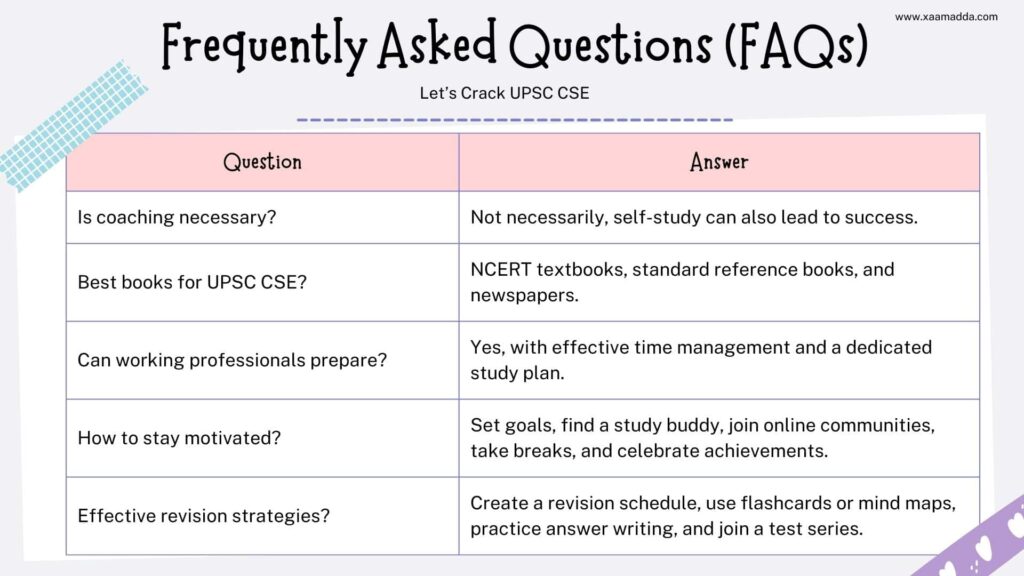
Is coaching necessary for UPSC CSE preparation?
Not necessarily! While coaching can provide structured guidance, study materials, and mock tests, self-study can also lead to success in UPSC exam in 6 months. The key is to find the right study material, stay disciplined, and create a personalized study plan.
What are the best books for UPSC CSE preparation?
The best books for UPSC CSE preparation depend on your individual preferences and learning style. However, here are some popular options:
- NCERT Textbooks: These provide a strong foundation in various subjects.
- Standard Reference Books: Authors like Laxmikanth, M. Laxmikanth, Ramesh Singh, and Bipan Chandra offer valuable insights.
- Newspapers: Keep up with current affairs by reading newspapers like The Hindu and The Indian Express.
Can working professionals prepare for UPSC CSE in 6 Months?
Absolutely! Many working professionals have successfully cracked the UPSC CSE in 6 months. The key is to manage your time effectively and create a study plan that fits your schedule. Utilize weekends, early mornings, and evenings for focused study sessions. Remember to balance your work commitments with your UPSC preparation.
How can I stay motivated during my UPSC CSE preparation?
- Set realistic goals: Break down your preparation into smaller, achievable targets.
- Find a study Fellow: Studying with a friend can provide motivation and accountability.
- Join online forums or communities: Connect with other aspirants to share experiences and learn from each other.
- Take breaks: Take breaks and do things you like to avoid getting tired.
- Celebrate your achievements: Reward yourself for your progress to stay motivated.
What is the most effective way to revise for the UPSC CSE?
- Create a revision schedule: Allocate specific time slots for revising different subjects.
- Use flashcards or mind maps: Visual aids can help you recall information more effectively.
- Practice answer writing: Regularly write answers to UPSC previous year questions to improve your expression and structure.
- Join a test series: Taking mock tests can help you assess your UPSC preparation and identify areas for improvement.
How can I improve my current affairs knowledge for the UPSC CSE?
- Read newspapers daily: Focus on quality newspapers like The Hindu and Indian Express.
- Watch news channels: Stay updated with current events through reliable news channels.
- Follow online resources: Subscribe to news websites, blogs, and social media pages.
- Make notes: Summarize key points and events in your own words.
- Practice answer writing: Write essays or answers based on current affairs topics.
Remember, consistency and dedication are key to UPSC CSE preparation. By following these tips and staying motivated, you can increase your chances of UPSC success in 6 months.
Beyond the Myths: The Reality of UPSC Preparation
Tired of the myths surrounding the UPSC CSE? Let’s clear up some common misconceptions and set you on the right path to success.
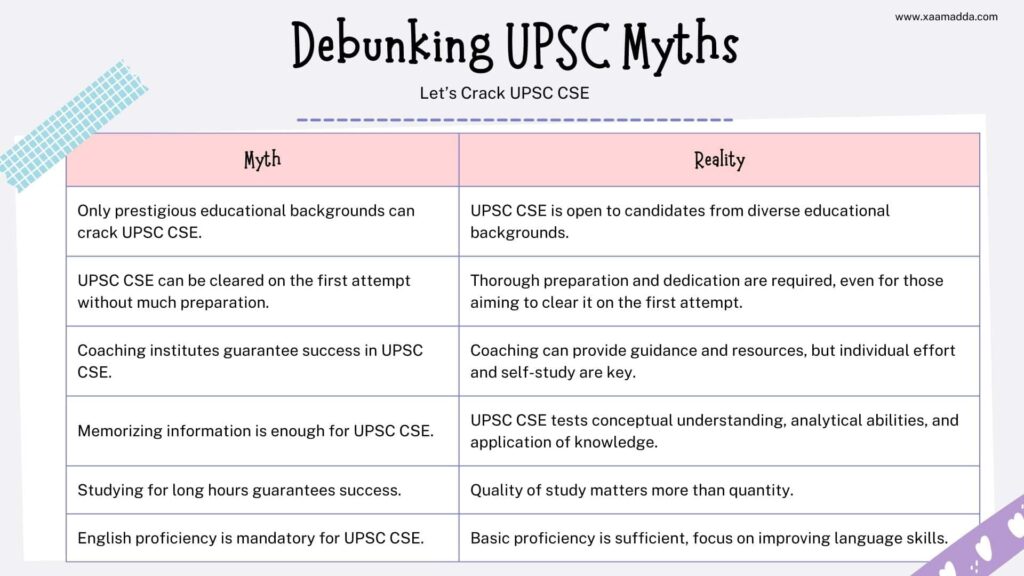
Myth 1: Only prestigious educational backgrounds can crack UPSC CSE
Reality: UPSC CSE is open to candidates from diverse educational backgrounds. Your knowledge, aptitude, and dedication matter more than the institution you attended.
Myth 2: UPSC CSE can be cleared on the first attempt without much preparation.
Reality: UPSC CSE is a highly competitive exam that requires thorough preparation and dedication. While a few exceptional candidates may clear it in 6 months or on their first attempt, most aspirants need multiple attempts.
Myth 3: Coaching institutes guarantee success in UPSC CSE.
Reality: Coaching institutes can provide guidance and study materials, but they don’t guarantee success. Your individual effort, self-study, and consistent practice are key to success.
Myth 4: Memorizing information is enough for UPSC CSE.
Reality: UPSC CSE tests conceptual understanding, analytical abilities, and application of knowledge. Mere memorization won’t suffice. Focus on understanding concepts and developing critical thinking skills.
Myth 5: Studying for long hours guarantees success.
Reality: Quality of study matters more than quantity. Focus on effective time management, breaking down topics into manageable chunks, and setting realistic goals.
Myth 6: English proficiency is mandatory for UPSC CSE.
Reality: While the exam is conducted in English and Hindi, basic proficiency is sufficient. Focus on improving your English language skills through reading, writing, and practicing answer writing.
Myth 7: The optional subject is the key to success in UPSC CSE.
Reality: The optional subject is important, but it’s not the sole determinant. A well-rounded preparation, including General Studies papers, current affairs, and essay writing, is equally important.
Myth 8: UPSC CSE is all about hard work, and luck plays no role.
Reality: Hard work is essential, but luck can play a role in certain aspects. However, focus on consistent effort, smart preparation, and improving your skills to maximize your chances of success.
A Final Word: Your Journey to UPSC Success in 6 Months
We’ve covered a lot of ground in our discussion of UPSC CSE preparation in 6 months. From understanding the exam to developing effective strategies, we’ve discussed key aspects of this challenging yet rewarding journey.
Key Takeaways:
- Self-study is important: While coaching can be helpful, self-study is important for UPSC success.
- Create a personalized study plan: Tailor your preparation to your strengths and weaknesses.
- Stay updated with current affairs: Read newspapers, magazines, and online sources.
- Practice answer writing regularly: Improve your expression and structure by writing answers to previous year questions.
- Join a study group or online community: Connect with other aspirants for motivation, support, and knowledge sharing.
- Take care of your physical and mental health: Ensure you get enough sleep, eat nutritious food, and manage stress effectively.
A Note of Encouragement
You’re not alone in this journey. Many people have been successful in the UPSC exam before you. Stay positive, believe in yourself, and don’t give up.
Remember: “The greatest glory in living lies not in never falling, but in rising every time we fall.” – Nelson Mandela
Additional Tips:
- Find a mentor or role model: Seek guidance from someone who has successfully cleared the UPSC CSE.
- Take breaks and relax: Avoid burnout by engaging in activities you enjoy.
- Celebrate your achievements: Reward yourself for your progress to stay motivated.
- Don’t compare yourself to others: Focus on your own journey and progress.
- Believe in yourself: Have faith in your abilities and potential.
Remember, the UPSC CSE is not just an exam; it’s a journey of personal growth and development. Stay focused, work hard, and never give up on your dreams.
